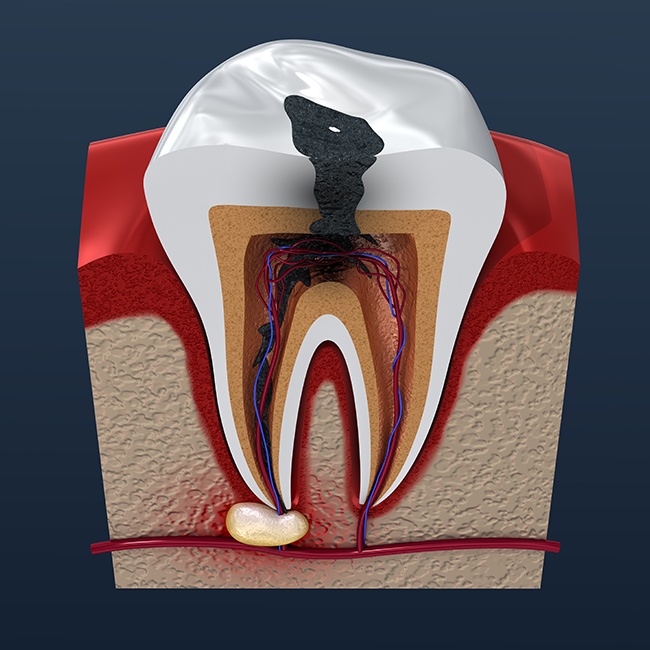Apicoectomy Surgery - Houston, TX
Effective Root Canal Retreatment
Your oral surgeon or dentist may have recommended apicoectomy surgery in Houston, TX to try to save your tooth. To understand more about the procedure or why it is necessary, an appreciation for traditional endodontic (root canal) therapy is helpful.
When a tooth becomes sensitive or has deep decay, sometimes a root canal is necessary to remove the diseased tissue (blood vessels, connective tissue, and nerves) from the inside of the tooth. This tissue lies in a canal in the center of the root. During a root canal, an access hole is made in the top of the tooth and small instruments are used to remove this tissue and reshape the often flat or ribbon-shaped canal into a more rounded profile. Once this is accomplished, the canal is sealed with a filling material to keep any residual diseased tissue from leaking out into the surrounding bone and causing irritation or infection. The goal of the root canal is twofold: one, to remove the tissue in the canal, and two, to seal the canal, especially in the portion near the tip of the root.
Gutta Percha has been used to seal the canal. Root canals can fail for any number of reasons by far the most common is failure of the seal at the tip of the root. One might ask, does this indicate a mistake on the part of the treating doctor? Not usually. We tend to think of the root canals as discreet, round, simplistic systems. However, in reality, the canal system is usually somewhat flattened in profile and may contain branches or extra canals which are not visible or accessible with traditional techniques. Because of this, it may be impossible for anyone to successfully treat that particular tooth with the traditional root canal techniques. The diagram at right also shows the result of failure of the root canal. Namely, the presence of leakage and subsequent infection at the apex or tip of the root. This is a problem that will not resolve or go away without some intervention. Oral antibiotics are never a satisfactory, long term solution either because the source of infection has not been removed.
What are Oral Surgery Options with a Failing Root Canal?

One solution would be to extract the tooth. The downside of this is that replacing teeth is extremely expensive, often several times the cost of treating the tooth. There is no substitute for a natural tooth.
A second option would be to retreat the tooth with the traditional technique. While this is not at all unreasonable, there are often some mitigating circumstances. Often, the tooth has been restored with a crown. Retreatment necessitates mutilating that restoration by drilling a large hole into the top of the tooth. An additional issue is more of a philosophical one. Most root canals fail not because of poor treatment but because of anatomic peculiarities that make treatment with the traditional techniques difficult or impossible. Those peculiarities are still present, and because of this, retreatment often has a relatively low success rate.
The third option is apical surgery (apicoectomy). This involves accessing the tip of the root directly and removing the diseased tissue, then preparing and filling the root tip itself. By making an incision in the gum tissue overlying the tooth, your surgeon then accesses the tip of the root. The root tip is then cut off and a small preparation or filling is made in the root tip itself and filled with a sealer to prevent further leakage of material out of the tooth. After a brief healing period, the gum tissue returns to normal.
What to Expect After Apicoectomy Surgery?

Eventually, after several months, the cavity in the bone surrounding the tooth will fill in with new bone completing the healing process. One may ask, how successful is this technique? The overall success is 80-85% when measured at ten years of time. A ten-year success will most likely continue to hold up for the life of the tooth. This is all the more remarkable when one considers that the procedure is typically performed on failing teeth to begin with. The downside of apicoectomy is primarily that it requires a surgical procedure to be performed and there is a brief postoperative recovery period to negotiate. The surgery itself is performed in our oral surgery office operating suite with either local anesthesia, IV sedation, or general anesthesia. While many patients prefer to have only a local anesthetic (the administration of numbing medicine to the area being worked on) more often, patients choose to be asleep or sedated. That is a decision best left up to the doctor and patient and can be explored more fully during your consultation visit.
Wisdom Teeth Extractions Oral & Maxillofacial Pathology Oral Cancer Orthognathic Surgery Dental Implants Pre-Prosthetic Surgery Facial Trauma Treatment Cleft Lip & Palate Surgery TMJ Treatment Corrective Orthodontic Surgery Sleep Apnea Treatment Anesthesia & Sedation Dentistry Cosmetic Facial Treatments Dental Emergencies View Our Services

